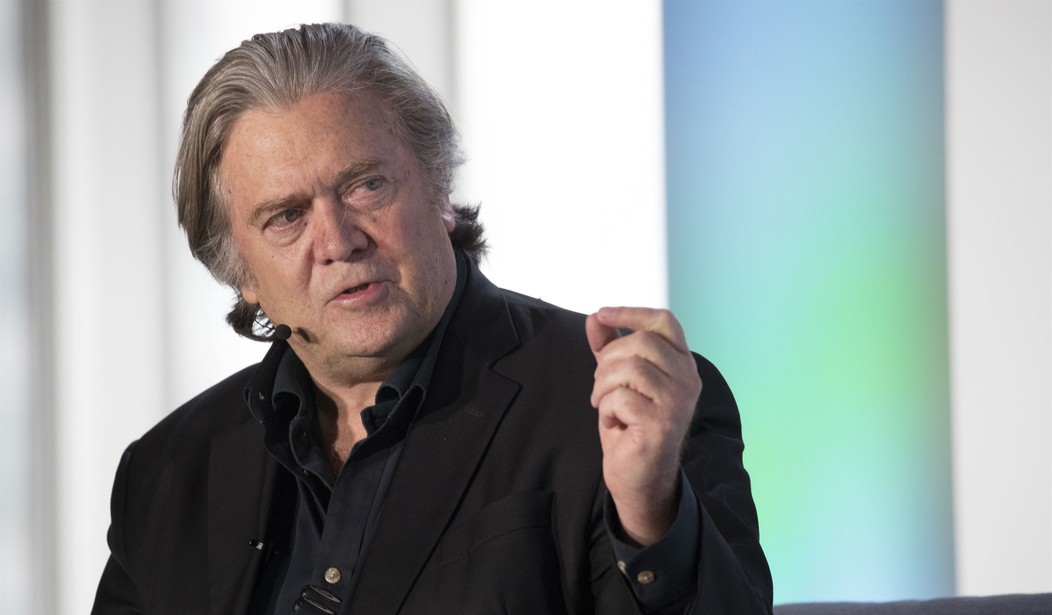A no-brainer. Indictments are always easy for a prosecutor to get and Bannon’s was open and shut. He was subpoenaed by a congressional committee, he made a farcical claim of executive privilege in refusing to testify, and now here we are.
Bannon, 67, is charged with one contempt count involving his refusal to appear for a deposition and another involving his refusal to produce documents, despite a subpoena from the House Select Committee to Investigate the January 6 Attack on the U.S. Capitol. An arraignment date has not yet been set in the U.S. District Court for the District of Columbia.
“Since my first day in office, I have promised Justice Department employees that together we would show the American people by word and deed that the department adheres to the rule of law, follows the facts and the law and pursues equal justice under the law,” said Attorney General Merrick B. Garland. “Today’s charges reflect the department’s steadfast commitment to these principles.”…
In its subpoena, the Select Committee said it had reason to believe that Bannon had information relevant to understanding events related to Jan. 6. Bannon, formerly a Chief Strategist and Counselor to the President, has been a private citizen since departing the White House in 2017.
The Trump/Bannon view of “executive privilege” seems to be that any conversation a president has with anyone, on any subject, is beyond the reach of the law. In reality, executive privilege exists so that the president can get candid advice from his advisors. A deputy is more likely to be honest with the chief executive if he knows he won’t have to answer later in court for what he says. But Bannon wasn’t a Trump deputy. He’s a populist rabble-rouser with a podcast who said on January 5 that “All hell is going to break loose tomorrow. Just understand this. All hell is going to break loose tomorrow. It’s gonna be moving. It’s gonna be quick.”
How did he know that? Did Trump tell him? You can understand why the committee is keen to know.
The Trump/Bannon view of executive privilege is not only limitlessly broad, it seeks to confer absolute immunity from having to testify. Instead of showing up, listening to the committee’s questions, and refusing to answer only those that actually touch on privileged subject matter, Trump and Bannon seem to believe that a subpoenaed witness should be able to blow off the whole process. It doesn’t work that way.
Now Merrick Garland’s going to have to decide whether to bring Bannon to trial. Considering that the DOJ has issued a press release celebrating the news, I assume that’s a done deal. Particularly since Bannon’s not the only Trump alum who’s currently defying a committee subpoena:
Reps. Cheney and Thompson on Meadows’ defiance of Jan. 6 committee subpoena: “Mr. Meadows’s actions today—choosing to defy the law—will force the Select Committee to consider pursuing contempt or other proceedings to enforce the subpoena.” pic.twitter.com/8RVSFNTL4f
— Manu Raju (@mkraju) November 12, 2021
Garland and the DOJ are under pressure to make an example of Bannon in order to show Meadows and other potential witnesses that they’re not messing around. Show up and answer questions or risk jail.
Is Bannon really going to jail, though? More likely is that there’s a tussle in court, he ends up losing, and eventually agrees to testify without being prosecuted:
Obtaining a conviction for any crime requires proof of acting with improper intent, and Bannon may have a strong defense in arguing that he was acting on the advice of his lawyer not to testify. Some federal courts have ruled that good faith reliance on the advice of counsel is a complete defense in a criminal contempt action…
The last Justice Department prosecution of a contempt referral came in 1983, during the Superfund investigation in the Reagan administration. Former EPA official Rita Lavelle was charged with contempt but her case, too, ended in acquittal.
All eyes now are on Trump’s lawsuit against the National Archives to prevent them from turning over White House documents from January 6. Trump will assert executive privilege in that case too; as an ex-president, his argument that his communications with deputies while in office should remain shielded is obviously stronger than Bannon’s “I talked to Trump while he was president so I don’t have to testify” nonsense. But Trump has already had bad luck: The three-judge panel on the D.C. Circuit that will hear his appeal on November 30 consists of two Obama appointees and one recent Biden appointee. He’s likely to lose, which means it’ll be in SCOTUS’s hands.
And if they rule against him too, Bannon’s executive privilege claim will be even weaker. If Trump himself can’t block the National Archives from turning over his presidential documents to the committee, by what logic can private citizen Steve Bannon continue to duck testifying? At what point is “good faith reliance” on your lawyer’s insistence that you don’t need to testify no longer truly good faith?
Bannon is reportedly set to surrender in D.C. shortly to begin the legal process:
ALERT: Law enforcement expects Steve Bannon to self-surrender on his criminal charges in DC on *MONDAY*
— Scott MacFarlane (@MacFarlaneNews) November 12, 2021
Here’s committee member Adam Kinzinger celebrating the news of the indictment and issuing a polite FAAFO admonition to other witnesses thinking of refusing to testify.
GOP Rep. Adam Kinzinger, a member of the Jan. 6 select committee, on Steve Bannon getting indicted: “It sends a really important message to future invited witnesses, future folks that are subpoenaed. You cannot ignore Congress. … I hope it sends a chilling message.” pic.twitter.com/TPJ5fdFtmL
— The Lead CNN (@TheLeadCNN) November 12, 2021








Join the conversation as a VIP Member